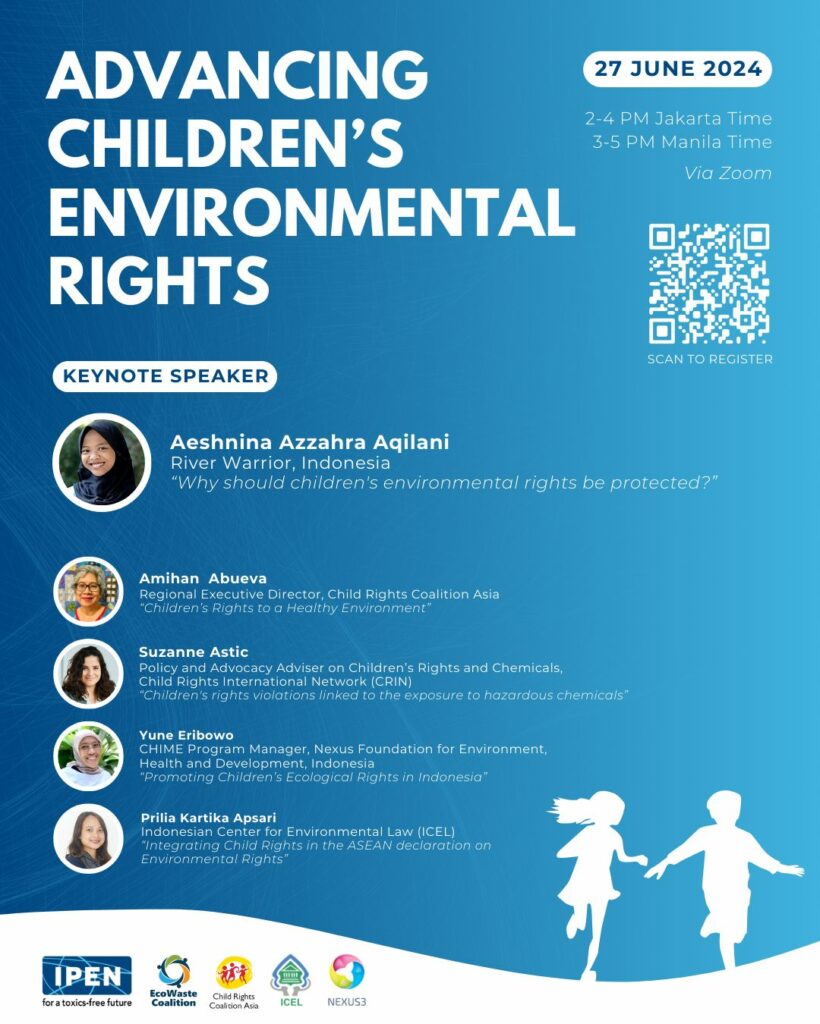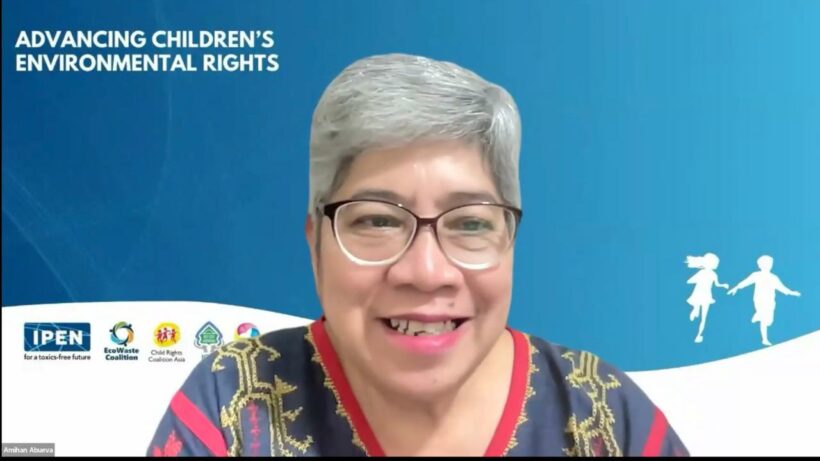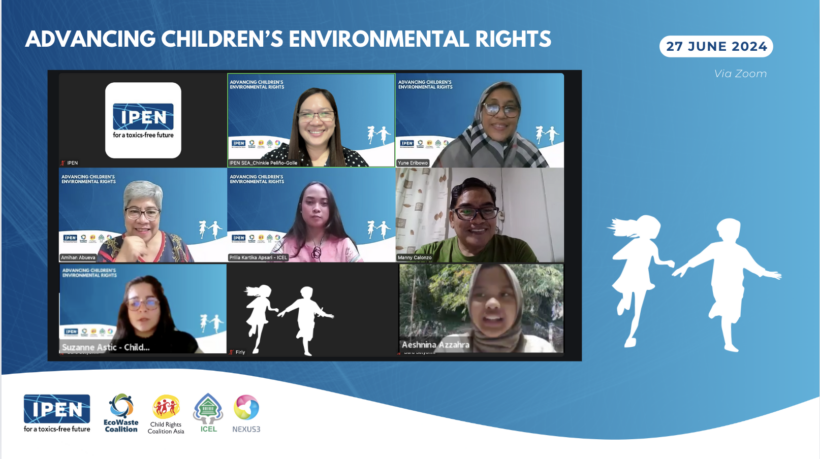28 June 2024, Quezon City, Philippines. As the effects of the triple planetary crisis of climate emergency, collapse of biodiversity and pervasive pollution are brought to light, civil society groups called on duty-bearers, governments and industries in particular, to take decisive measures that will protect and advance children’s environmental rights with the meaningful participation of children and their supporters.
At a webinar held on June 27, 2024, child and adult leaders of child rights-focused and environmental rights-focused non-government organizations spoke as one in pushing for the human right of all children to a clean, healthy, and sustainable environment to be recognized and upheld.

The two-hour online discussion on children’s environmental rights was co-organized by the International Pollutants Elimination Network – Southeast and East Asia (IPEN-SEA), Child Rights Coalition Asia (CRC Asia), EcoWaste Coalition-Philippines, Indonesia Center for Environmental Law (ICEL) and Nexus3 Foundation-Indonesia.
As explained by Chinkie Peliño- Golle, IPEN-SEA Regional Coordinator, the webinar was held to contribute to the increased awareness and understanding of children’s environment rights, and the efforts of civil society organizations to promote and advance such rights locally, regionally and globally.
In his welcome remarks, EcoWaste Coalition’s campaigner Manny Calonzo reiterated that children are not little adults, stressing “It is important for our society, especially for duty-bearers, to protect children from the moment they are conceived and throughout their development against all environmental hazards that can block their potentials to fully grow and succeed,” including biological, chemical, physical and psychosocial hazards.
Keynote speaker Aeshnina Aqilani, an East Java student, Co-Captain of River Warriors and Youth Ambassador for Break Free From Plastic (BFFP) movement, said plastic waste exported by developed countries to Indonesia is aggravating the country’s domestic plastic problem, and is poisoning the food chain and the communities where she and other children live. “The plastic pollution crisis is depriving Indonesian children of their ecological rights,” said Nina as she is fondly called. “I want my generation to live in a safe and clean environment free of plastic pollution,” she said, underscoring the urgency for developed countries to deal with their own waste at home instead of dumping them to low- and middle-income countries like Indonesia.

Asia Democracy and Human Rights awardee Amihan Abueva highlights the importance of upholding the children’s right to a clean, healthy and sustainable environment.
Asia Democracy and Human Rights Award 2023 recipient Amihan Abueva, Regional Executive Director of Philippine-based CRC Asia, delved on the importance of General Comments to Children’s Rights to a Healthy Environment of the United Nations Convention on the Rights of the Child (or GC No.26 of the UNCRC), which provides an authoritative guidance to states on the pressing need to uphold children’s environmental rights. “Climate crisis is a child rights crisis,” she pointed out. “The status of children should be recognized and their demands for urgent and decisive measures to tackle global environmental harm should be realized.”
Abueva urged governments to “respect, protect and fulfill children’s rights by taking bold, concrete steps and keeping their promises to make sure every child grows up in a clean, healthy and sustainable environment,” and also “by creating laws, regulations and policies to prevent companies from polluting the environment and harming children, and to make sure businesses do not hide their environmental impact or engage in misinformation like green washing.”
Suzanne Astic, Policy and Advocacy Adviser on Children’s Rights and Chemicals of the UK-based Child Rights International Network (CRIN), discussed how children’s rights are infringed upon with reference to UNCRC and other relevant human rights instruments and experts’ reports and recommendations, noting “it is very important to remind the decision makers that we have legally binding text (such as the UNCRC and others)… and that a lot of children are being impacted and violated by the exposure to hazardous chemicals.”
Astic cited some examples of children’ rights violations, including the 1) exposure to hazardous pesticides, 2) prenatal exposure to glyphosate (a herbicide), 3) exposure to hazardous chemicals found in toys such as PFAS, “the forever chemicals,” 4) “sacrifice zones” and the export of very hazardous chemicals and waste, and the 5) loopholes in existing chemical legislation, which violate the rights to health, physical integrity, play, access justice and remedies, and non-discrimination.
Educator Yune Eribowo of Nexus 3 Foundation talked about the group’s CHIME project, an initiative to protect and improve children’s health interventions in the most polluted environment in Indonesia such as communities contaminated with mercury due to artisanal and small-scale gold mining (ASGM) , and the Children and Youth Action for Environmental Children’s Rights (CYA-ECR) project in partnership with GITIB, Inc. based in Ozamiz City, Philippines.
Finally, researcher Prilia Kartika Apsari of ICEL spoke about the ongoing advocacy to integrate children’s environmental rights in the ASEAN Declaration on Environmental Rights, noting some of the challenges being faced by advocates such as the weakening of the draft text on private sector’s responsibility to guarantee environmental rights and the removal of the article on combating and preventing Strategic Litigation against Public Participation (SLAPP), including the deletion of the clause on attacks and threats against environmental human rights defenders.






